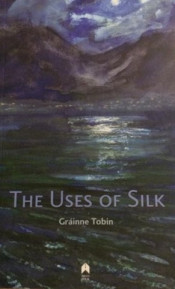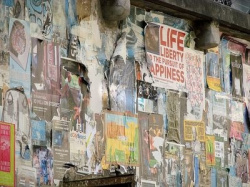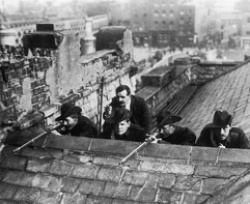The past, and other countries: Gráinne Tobin (2)

It’s been hard to concentrate, these last few days. It’s hard to think about poetry when you’re consumed with rage and frustration in a world where truth is an endangered species, and the management of the body politic has become a kind of game for the ones who have tickets, and the rest of us are shut out. It’s 80 years since Auden wrote ‘September 1, 1939’, four years before I was born into a world that had been at war for all of them.
I sit in one of the dives
On Fifty-second Street
Uncertain and afraid
As the clever hopes expire
Of a low dishonest decade:
Waves of anger and fear
Circulate over the bright
And darkened lands of the earth,
Obsessing our private lives;
The unmentionable odour of death
Offends the September night.
A low dishonest decade: there’s an epitaph for the last 10 years in this country that I used to think was mine, and which I now hardly recognise. We’ve been used to muddling along (or compromising) and on the whole got on with each other. Not any more. Politicians who were born into a world of entitlement, and who will never come face to face with it have validated ignorance, intolerance, racism; it’s fashionable to be xenophobic and be contemptuous of expert evidence, of the qualified, of experience and nuance. In a world in which a phrase like ‘fake news’ has traction, the purposes of language itself are threatened.
And curiously, it’s why poetry (and all well-wrought language) seems more important than ever. I’m reminded that, as I wrote last week, when I met Gráinne Tobin for the first time nearly 40 years ago, it was in a city divided by religious hatred. I’ll not ever forget the barbed wire and barricades of the Crumlim and the Shankhill Roads. That was Gráinne’s world; she lived through it and wrote through it, and that gives me some hope even now. What will survive of us is love. That’s what lies at the heart of the poetry I treasure, and I’m delighted to be introducing Gráinne for a second week, and to bring you up to date with what she’s been up to since 2010 where last week’s post sort of terminated.
She retired from the day job then (as an English teacher), and “wondered why I wasn’t writing all day every day. But as I should have known, it doesn’t work like that at all.” Whatever ... she ‘s been kept busy, accepting all offers connected with poetry in that first year, including travelling scores of miles on buses in heavy snow to a mass book-signing by 70 authors in Galway to celebrate 70 years of Kennys bookshop, and finding herself standing beside President Michael D Higgins, who is “even shorter than I am and a person I seriously admire”.
She went by ferry and train to Blackpool, to read her shortlisted poem in the libraries’ Wordpool competition, but they didn’t know she was there. She says: “I didn’t know I should be pushy about declaring myself, so I sat awkwardly in the audience waiting to be called on, and someone else read it. Let that be a lesson to me.” (I like that story very much. We learn against the grain to be pushy. )
She applied for an Arts Council of Northern Ireland Single Individual Artist Award; the ACNI grant was for mentoring, so she had a chance to talk in detail about her manuscript with Penelope Shuttle, who advised her to start entering competitions.
She won competitions, was invited to send poems to anthologies and to lead creative writing workshops for adults, teenagers, and children. She’s had three poetry residencies, in the Tin Jug Studio in Birr, Co Offaly; in Sumburgh Head Lighthouse, Shetland; and in Cill Rialaig, Co Kerry.
Her writing group, Word of Mouth, published its Russian-English parallel text, When the Neva Rushes Backwards in 2014 with Lagan Press. It was the product of working on these pieces by St Petersburg women poets for years , a huge group effort with expert help from Russian speakers. Some of of the English versions of the poems were in Modern Poetry in Translation.
The Word of Mouth Poetry Collective, which had been her main support in writing poetry, voted to dissolve itself in 2016 after 25 years of meeting monthly in the historic Linen Hall Library in Belfast: “We felt that our work was more or less done, except for the Of Mouth reading series which we wanted to continue.”

The cover image is by the painter Jim Manley who lives in Killough, on the Co Down coast. She says: “The picture has our house in it as one of the tiny lights of Newcastle, just visible if you wish hard enough, across Dundrum Bay, beyond the path of moonlight on the sea. There is a temptation to X our spot on the left edge of the page.”
Right. All up to date, and time for the poems.
Damian Smyth has commented on the qualities of the work in this collection … “subtlety, cleverness, a succinct wisdom, exhilarating formal dexterity –The dramatis personae are varied and unexpected; the emotional range expansive enough to run from elegy to slapstick; the diction charged, ingenious,” and Penelope Shuttle tells us that “Gráinne Tobin casts a steely sceptic eye over the Ireland of her childhood but her view is mediated by gentler memories of family tenderness surviving amid the fervour and craziness of 1950s religiosity. Here is a poet employing a nimble wit, seeing behind facades, moving in the slipstream of savage histories in and beyond Ireland.”
I think you’ll find all this confirmed by the poems in last week’s part one, and should you need convincing, here are three more, each with an introduction by Gráinne. Sit back and enjoy the ride.
“ ‘An Irishwoman Reads Dodo with Keith Douglas’ came from a week’s writing break alone in Alicante, in a state of solitary absorption, wandering round a foreign city talking to myself about this young man who I only knew from his writing. As someone who has lived through the disturbing presence of soldiers on the streets of Northern Ireland, it was good to bring him to mind both as a strange military youngster and also as one of us poets. He died too early, at 24, and I admire his work very much. I feel a tenderness towards him, though I imagine we might not have hit it off in real life.”
An Irishwoman Reads Dodo with Keith Douglas
In spite of his photographed moustache
and his few years of manliness, he is excited
by tinned rations jazzed-up for squadron dinners.
An acceptable hot porridge can be made
of hammered biscuits, boiled and laced with jam.
Any dusty tent can be made beautiful
with flowers and books in a cut-out petrol can,
such as the tank-men fill with desert sand
as bricks to make small houses for latrines.
He’s careful of the whiskey. He must stay fit
to note the fear that pushes at his belly, just
where the shell would enter, and his useless pity
for the burnt corpse of one who’d laid a towel
over his wounds against tormenting flies.
In hospital after the land-mine, the lieutenant
needs the book they bring – he reads it twice –
Dodo, Edwardian comfort to draw his poet’s eye
away from the wreckage of flesh and the ends of bone.
I find it on my Kindle, and I read Dodo too
at bedtime in his honour, by its faded glow,
saving his Zem Zem for sensible daylight –
the boy learned how to kill and soon was dead
as a doornail, blown to glory, joined the majority.
I loved learning that Keith Douglas used pulp fiction ….tripe, if you like ….as a comfort blanket; I like the unforced allusions, the echoes.
the fear that pushes at his belly, just
where the shell would enter
takes me back to ‘Vergissmeinicht’, the poem that became a touchstone for me about the importance of the image, of accurate seeing, and economy of means.
she would weep today to see
how on his skin the swart flies move;
the dust upon the paper eye,
the burst stomach like a cave
I like, too, that line break in the last stanza, the matter-of-factness, like Tony Harrison’s “your life’s been blown to smithereens”, and the black irony of “glory”:
the boy learned how to kill and soon was dead
as a doornail, blown to glory,
Back to Grainne: “ ‘Junction Box’ is about a magic bit of practical gadgetry or street furniture beside the Crescent Arts Centre in Belfast. Every time I pass it, I stop to put my ear to it, and it always has sound coming out. It has an emotional charge for me and possibly for other passers-by. I can’t help being romantic about communal experience: the junction box seems to have an invisible choir of diverse voices celebrating our fragile peacetime. (We only began to get incomers from other places when the Troubles ended, as before that, few people would have wanted to join us here.) I fretted about referring to the Spanish Catalan painter Tápies because it might be an obstacle for some readers – I only know of him by chance, and allusions can be really daunting – but then decided that anyone who was bothered could always Google him, and the comparison with his work is exactly what I mean, so I didn’t want to give that up.”

Upper Crescent, Belfast
Something is singing
among cracked-up flagstones
under the young leaves
of a lime tree where the park’s square edges
nudge the railings of a sooty church,
grey rubble-stone still smudged
from the city’s smoking past,
and there it is,
shoulder-high, an arm-span wide, a big black box
in painted steel with a rutted crust,
the under-paper from posters that you can’t pick off,
stained and overlapped so in the end
it looks deliberate, distressed graffiti-chic,
or like an artwork by Tápies that marks the times
in dirty layers,
and this is where
it’s coming from – the sound –
a sitar-accordion drone,
an old song echoing, an imperfect note,
single yet multiple, voices plaited together
in a chord with no pause, chanting day and night
beside the parking meter and the litter bin.
I read this and thought of Penelope Shuttle’s endorsement of a poet employing a nimble wit, seeing behind facades. Exactly so … what I like is that it’s a poem to read aloud, to follow the twists and turns of the landscape through the twists and turns of a poem that’s a single sentence that weaves like a chant or a harmony. It’s lovely.
Grainne, once more:
“The third poem is in The Uses of Silk and came from my preoccupation with the 1916 Rising and its effects on the later history of Ireland, and on my family. My parents were born into moderate anti-Treaty families, around the time of Partition. They were babies during the civil war, as children attended the monster 1932 Catholic jamboree in Dublin that sealed the reconciliation between the former revolutionaries, now in government, and their church, and as young adults they moved north of the border during ‘the Emergency’ ie WW2, to find teaching jobs, ending up having a family of wee northerners, and being politically active (in the SDLP, at first a bit pinko, later more nationalist) during the Troubles. The epigraph is a family joke, one of those parental sayings you grow up with and later trace to a quotation.”

Where were you in 1916? I wasn’t born. Excuses, always excuses!
- Brendan Behan
Of course I wasn't yet born, but I was included
with a quarter of the country’s population
at the Eucharistic Congress of 1932,
latent in a pair of ten-year-olds who were yet to meet.
An ovum in her reserves, the boast of Catholic Ireland,
I hid inside my mother, who wore her good coat
on the excursion train from Portarlington
in fine weather, said to be God’s answer
to thirty-seven thousand spiritual acts of self-denial
undertaken by the new and ancient nation
and placed on record in the archbishop’s office.
The child who grew up to be my father
wore the lanyard and badges of a Limerick troop
of the Catholic Boy Scouts of Ireland,
one of fourteen hundred plucky little fellows
encamped with trench latrines on a boarding-school lawn
and tireless in fifteen acres of the Phoenix Park,
directing a million pilgrims, holding lines and fetching water.
Where are their two faces in the crowd
that knelt with its shriven leaders in the grass?
The hungry streets, a supernatural toyshop
of angelic toy theatres, as by night
the Post Office roof beamed sky-writing,
GLORIFICAMUS. And I hear the last
of the ornate urinals made for the Congress
was bought in the seventies by a student of art.
“I did a lot of research for this poem and then tried not to overload the poem and to keep most of it out of the way while writing. It still fascinates me. I read as much as I could about the 1932 Eucharistic Congress. The details were much, much more surreal than I can bear to describe in the poem. Processions of girls in white First Communion dresses who were called ‘the boast of Catholic Ireland’ - creepy - and international bishops in full campery of purple silk robes and handmade lace. It came across as rather earnest, but with an unpleasant tinge of 1930s Nuremberg rally about the whole thing. GK Chesterton was the newspaper reporter who mentioned the pathos of the ‘supernatural toyshop of angelic toy theatres’ in the poorest streets. This national pop-festival of piety presaged the tight Church-state partnership that led to the mother and baby homes and their aftermath.”
Final word from Gráinne: for now:
“The next thing I’d like to do now, apart from keeping on working on poems, is to get on with sending letters out, asking festivals if they would like to book two poet friends and me for readings. It’s an odd thing to advertise oneself but how else is anyone going to know we are available as a package? And then I want to make my work more traceable by sorting out an online poetry presence that doesn’t make me want to hide in the wardrobe and deny everything. Perhaps a modest and sober webpage? I have nothing to lose except my ancient convent conditioning.”
And from me:
That last comment makes me want to devote a whole post to the business of making yourself visible as a poet. I can do my bit to make other poets visible, but what about self-promotion? It’s not why I write poems, but the thing is, I have a lot of unsold books in boxes just behind me. They won’t sell themselves. Hmmm.
Still, the main thing now is to thank Gráinne Tobin for her generosity and for her poems. And a personal thankyou for initially distracting me from the Brexit nightmare, and then, through these poems, reminding me that people have come through worse.
Next week, some thoughts about poetry pamphlets and and a Northumberland poet. See you then.




